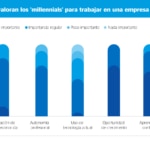Seven keys for managing a team of millennial employees
Having a close relationship with your employees, challenging them every day and creating a coworking-type workspace are some of the keys managers should bear in mind when managing a professional team formed by millennials.

For many experts, the millennials form a generation in themselves, whereas for others it is more a question of lifestyle. These are individuals aged between 16 and 34 whose daily lives are marked by the new technologies. This generation is extremely environmentally conscious, and many spend part of their free time on volunteer work. Their priorities are their family and friends, travel, sport and work.
For millennials, it is essential to work in something they enjoy, and the most popular professions are engineering, testing video games, medicine and graphic design. The means the most complex aspect facing companies is the professional management of their employees. This is no easy task, given that most managers belong to the baby-boomer generation or to Generation X, whose principles and values are much more traditional than the millennials'.
Companies also have a hard time, as it is much more difficult to manage their employees' worth –five different generations may end up working together in the same space–, and they need to adapt to each one.
Whereas previous generations conceive work as the only way to survive, the millennials have another outlook on life in which obligation has given way to choice.
Companies are no longer places where you spend your whole life –this generation chooses a workplace where they feel comfortable and which helps them grow professionally.

Seven keys to exploiting millennial talent
What are the guidelines companies can follow to effectively manage a professional team of millennials?
This new generation has a series of very different demands and aspirations from their predecessors, so companies need to take a new approach to managing the millennials' talent. Companies need to adapt their human resources policies and their leadership styles to match the aspirations of a generation that will represent 75% of the active population worldwide by 2025.
Companies need to exploit millennials' familiarity with technology to improve skills across the organization
These are the seven keys companies need to remember to exploit and manage the talent of their millennial employees:
1. Stimulating and challenging work: this generation's goal is to find a job that challenges them on a daily basis and is also attractive. Above all they are looking to provide a differential value in their routine tasks.
2. Progress: the millennials aspire to move to a new position in the company every 12 or 24 months. They are also looking for companies that combine training, play and work. They set great store by collaboration and knowledge exchange, so they view international and functional mobility very favorably. This generation's hallmark is its immediacy, so they need their company to set short-term targets with visible results.
Managers must help them identify opportunities and assign different projects so millennials can develop new skills.
3. Close relationship with their superiors: this generation demands an accessible and close relationship with their superiors, and they also need their opinion to be heard when decisions are taken. They give a very high rating to companies that offer mentoring sessions, and to bosses that give them feedback on a daily basis.
They also require their superiors to be progressive and not to discriminate their employees on the basis of sexual orientation, ideology, race or religion. They must show total respect for them and their lifestyle.
4. Coworking-type workspace: these new professionals want to perform their professional tasks in spaces like the ones to be found in Starbucks cafes. They like to work in a varied organization which encourages socialization and where big companies work alongside start-ups and self-employed entrepreneurs.
5. Recognition before remuneration: for millennials, being valued for their professional performance is more important than their salary. But this doesn't mean that salary isn't important, because they like to earn as much as possible. But salary takes a back seat to work-life balance, good relations with their workmates, and connecting with the company culture.
6. Work-life balance: this generation aims to work in a company that allows them to have flexible working hours so they can spend more time with their family and have more free time. Unlike previous generations, they want to work by results and not with a fixed office schedule.
7. Digital companies: the millennials like it if their company uses technology to establish social relations and encourages the use of social networks between workmates inside and outside the company.
Companies need to exploit millennials' familiarity with technology to improve skills across the organization.

Millennials like companies with prestige and a recognized brand because they are aware that their value in the market is closely related with their knowledge and skills.
They don't want to stay in the same company until they retire, but are looking to change their jobs guided by their interests and motivations.
Sources: Harvard Deusto Business Review, IESE Insight, BBVA and BBVA Millennials Project